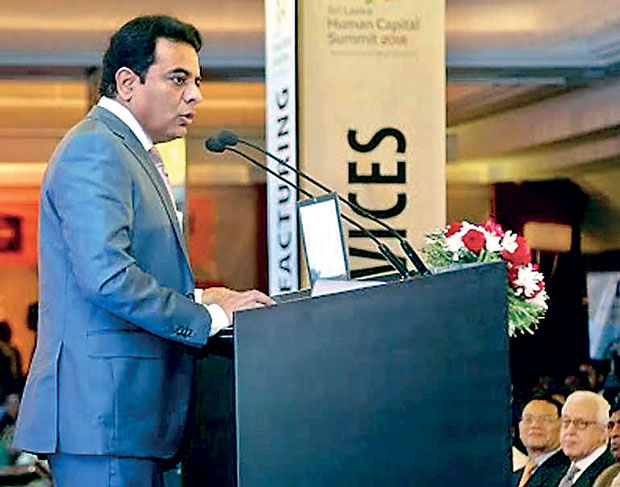Reply To:
Name - Reply Comment
Last Updated : 2024-04-27 00:40:00
 Telangana State IT and Commerce Minister Rama Rao speaking at the Sri Lanka Human Capital Summit in Colombo said that the Telangana Academy for Skill and Knowledge created a platform between the government, academia and industry to enhance the employability of the youth in Hyderabad
Telangana State IT and Commerce Minister Rama Rao speaking at the Sri Lanka Human Capital Summit in Colombo said that the Telangana Academy for Skill and Knowledge created a platform between the government, academia and industry to enhance the employability of the youth in Hyderabad
 Today does our education system, technology and laws support a modern workforce? Are employees satisfied with the skills and opportunities they have for the way they work? Are their jobs secure? These are key questions often asked by employees and employers at conferences.
Today does our education system, technology and laws support a modern workforce? Are employees satisfied with the skills and opportunities they have for the way they work? Are their jobs secure? These are key questions often asked by employees and employers at conferences.
We know there’s no one-size-fits-all approach to these ever-changing workplaces and technology; every country and organisation will need to rethink how people collaborate to improve their skill levels and enhance productivity.
The government has today recognized the fact that Sri Lanka needs to ramp up its higher education system to staff its rapidly expanding economy and that need creates major changes in the demand for knowledge workers and the skills they posses.
The prime minister in his budget speech pointed out that the country needs to fast track the country’s skill development programme to meet the market demands by gearing our youth to secure high-paid jobs. Further, he said the government has secured budget support from the World Bank and Asian Development Bank (ADB) to supplement government expenditure on skills development. In addition, the budget proposal to support top professional bodies to set up and expand technical programmes in the country would also help to grow our professional talent pipeline.
While there is no debate that creating a workforce fit for the future by anticipating and building competencies for future needs should become our topmost priority, we also need to get our workforce job-ready (set our young people as fast as we can on the path towards finding a job that’s right) like yesterday, to meet our immediate manpower needs.
However, to realize this goal in addition to the resources we need to put in, we need to have a sustained dialogue between the employers and trainers, coordination across government institutions, proper labour market information and good employment services.
The picture we now see is there are jobs and no takers. The papers in all languages are full of vacancies. This suggests that there are jobs but hard to find people who want them.
Jobs and no takers
Since we are looking to build our exports and attract good foreign direct investment (FDI), we need to make a large number of people job-ready to work in the industry. However, maximizing their value requires us to know our talent, upcoming skill shortages and understand the impact of the social media infusion.
Therefore, the investments we make now in education will contribute significantly to economic growth and will be key to our current and future competitiveness. Indeed, if the private returns are so high on these investments, most households on their own accord are likely to make adequate investments in human capital development.
However, the difficulty of borrowing to send children to school affects especially the poor. Creditors cannot easily stake a future claim on embodied human capital as they can for other types of collateral and therefore many low-income families are forced to invest less in their children’s schooling. These free market failures in principle, suggest making concessionary loans available via the state.
A more common, alternative is for the government to reduce the direct costs for schooling by making quality public schooling available free or at subsidized rates. Most interventions generally consist of making schooling available free and sometimes even compulsory.
Research suggests the difference between social and economic returns from education at a macro level is probably higher at the primary and secondary levels than at the university level. Many positive spillovers come from literacy acquired at lower levels of schooling, while the returns from training at the university level are almost fully captured by the higher income of university graduates.
Vocational training also has high economic payoffs, if it improves worker productivity. More importantly, evidence suggests that vocational training is most cost-effective if the trainees have a solid base of primary and secondary education. All of this argues for primary and broad based secondary education as a means to improve a nation’s productivity and income distribution.
Vocational training
The government in its budget proposals say that its 2020 Vocational Education Strategy consists of rehabilitation and construction of technical collages and vocational training centres, development of training material and the provision of equipment, staff training and professional development. This is a positive move to make young people job-ready, because in most of the successful export economies the training provided by vocational training institutes jointly to upgrade the skills of their workforce has been crucial, since high-level skills are essential for manufacturing-related activities.
But while vocational training is widely recognized as important, such training is rarely cost-efficient when provided by the state systems. Most firms therefore prefer to do their own training, partly because many skills are company specific.
There is ample research to show that the return on the training investment is higher in industries that engage well-educated workers and also in environments where there is rapid technological change. Singapore’s use of training to promote the information technology sector through a concerted programme that involved educational institutions, providing training subsidies to schools and office workers and digitizing of the civil service, helped the country to achieve leadership in technology-related services.
This success illustrates the importance of a government’s ability to foresee a major opportunity and then promote public-private partnerships to invest in human capital formation. However, to make it a success, businesses must also stand ready to take advantages of the support the government is willing to provide to promote human capital formation. In addition, the state must ensure that they maintain the per student share, in real terms, of government funding education.
(Dinesh Weerakkody is a thought leader in HR)

Add comment
Comments will be edited (grammar, spelling and slang) and authorized at the discretion of Daily Mirror online. The website also has the right not to publish selected comments.
Reply To:
Name - Reply Comment
US authorities are currently reviewing the manifest of every cargo aboard MV
On March 26, a couple arriving from Thailand was arrested with 88 live animal
According to villagers from Naula-Moragolla out of 105 families 80 can afford
Is the situation in Sri Lanka so grim that locals harbour hope that they coul